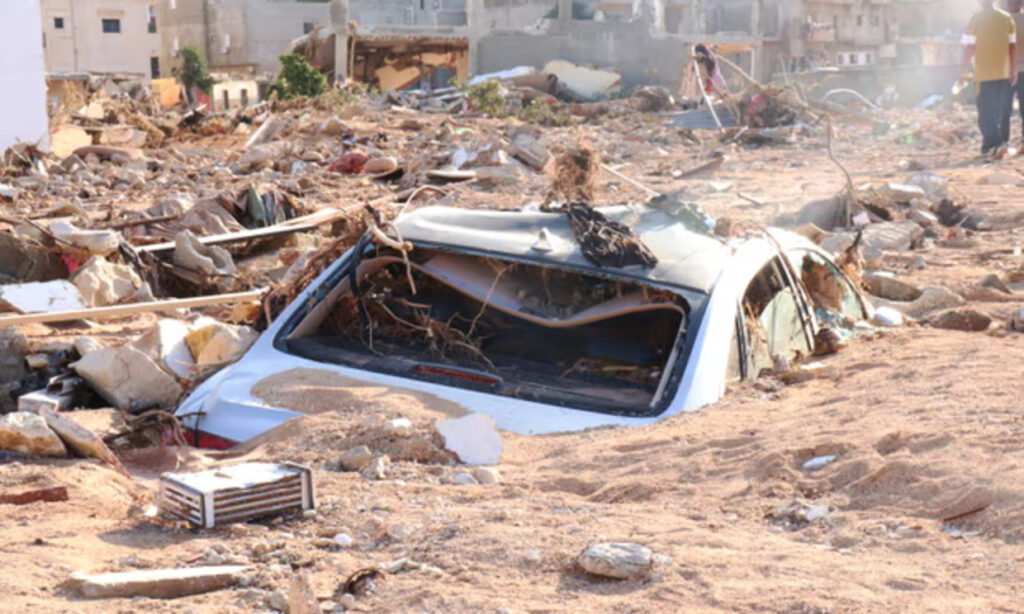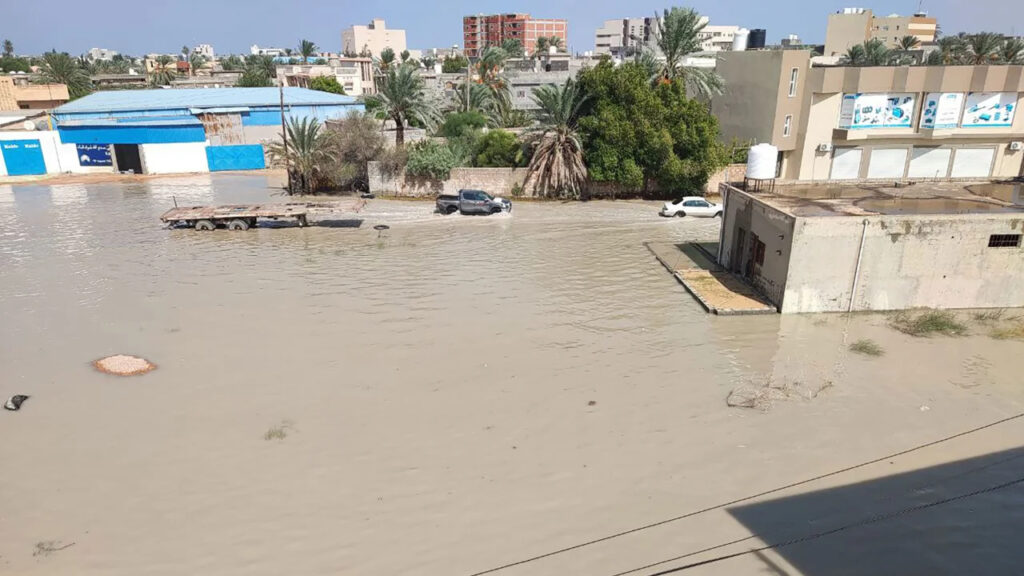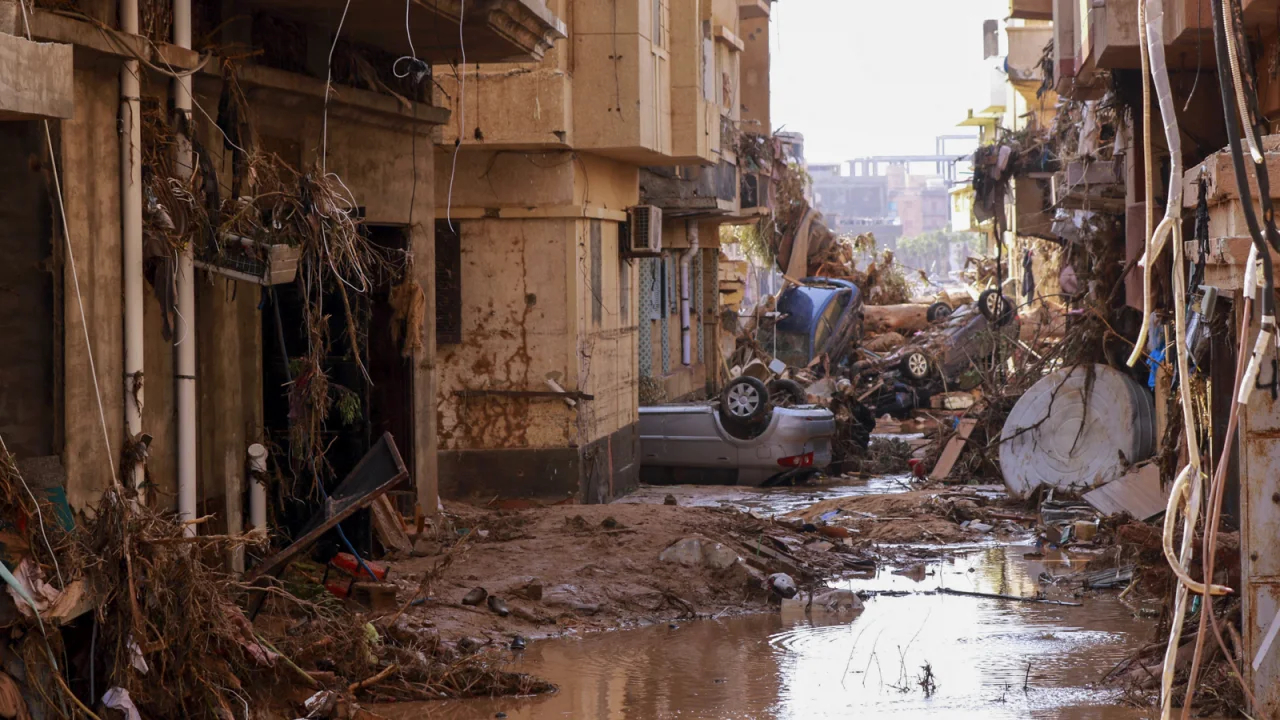Conflict in Libya Continues to Focus on Climate Change, Corruption, and Catastrophe

Libya Floods
Recent devastating floods have left a path of destruction in the wake of eastern Libya, particularly in the city of Derna. Following heavy rains, two dams burst, causing a wall of water to envelop the city, resulting in thousands of fatalities, over 30,000 missing people, and tens of thousands of displaced people.
The terrible toll of the calamity has revealed the fatal shortcomings of Libya’s government, which has long disregarded its responsibility to look out for and assist its citizens. A strong reminder of the urgent need to address both climate change and governance challenges is provided by this man-made tragedy, which was fueled by corruption, poor infrastructure, impunity, and political power struggles. It is apparent that climate change is intensifying extreme weather occurrences around the world, even though it is still unclear to what extent the calamity was related to the climate issue. The international community must acknowledge its shared obligation to give genuine support and assistance to Libya during this difficult time as it faces these problems.

The Man-Made Tragedy
The calamity in Derna and the surrounding territories is due to both systemic flaws and corruption within Libya’s governance structures as well as the fury of nature. The nation’s vital infrastructure has been destroyed by more than ten years of revolution, civil conflict, and political impasse. Unbelievably, one of Derna’s dams had not been adequately maintained since 2002, demonstrating the inattention to detail of the authorities.
While some catastrophes happen without notice, Storm Daniel did not, in fact, do so. Having seen the destruction in Greece, officials in Khalifa Haftar’s eastern Libya had plenty of time to prepare for the impending catastrophe. Even yet, their answer was pitifully insufficient. While some inhabitants were asked to leave, others were told to stay put as the water levels rapidly rose behind the dams. It serves as a clear reminder of the serious consequences that result when governments fall short in protecting their populations.
The misery of Libya has also been made significantly worse by corruption. Important infrastructure has been pillaged by powerful people and their allies, making it harder for the country to handle emergencies. Because of this, even rescue and relief attempts have been stymied, leaving youngsters in the center of the rubble pleading for assistance.
The Politicization of Relief Efforts
Tragically, politics—both at the national and international levels—have tainted the calamity in Libya. Both the internationally recognized Tripoli government and Haftar’s rival administration appear more concerned with retaining power than with easing the misery of their people. When their countrymen need them the most, important members of civil society who could have organized relief operations are languishing in jail.
Additionally, the international response to this catastrophe has been excruciatingly delayed and insufficient. Foreign powers have frequently meddled in Libya’s internal affairs without taking care of the needs of its citizens because they have vested interests in the country’s enormous fossil fuel riches and regional security. For instance, the European Union has generously funded Libya to reduce migration while remaining silent on violations of human rights committed by the Libyan coast guard. The moment has come for these foreign nations to act and provide the afflicted people of Libya with real aid.
France has a special obligation to secure a strong European reaction because of its enormous support for Haftar. The agony of the Libyan people is made worse by their legitimate grounds for feeling abandoned by the international world. The world must understand that the people of Libya require more than just sentimental support; they also require concrete assistance.
Climate Change and Extreme Weather
There is an undeniable worldwide pattern emerging, even if it is still unclear to what extent Storm Daniel’s destruction is related to climate change. Worldwide, extreme weather events like flooding are occurring more frequently and with greater severity due to the climate issue. Recent occurrences in Hong Kong, Greece, China, the US, and Spain serve as alarming indications of what many regions may face in the future.
Implementing mitigation techniques and methods to reduce carbon emissions is more important than ever. Communities all across the world are already dealing with the effects of climate change, which is not merely a hypothetical danger. To tackle this global issue and prepare for climate change, governments, organizations, and people must collaborate.
The tragedy in Derna and eastern Libya serves as a somber reminder of how climate change and poor governance interact. Both natural disasters and human incompetence, corruption, and political power struggles contributed to the catastrophic floods. While the severity of extreme weather events is increasing due to the climate problem, the destruction is made worse by governments’ failure to safeguard their citizens.
It is crucial that the international community ramps up its efforts to give Libya substantive support as we face these urgent issues. Foreign governments must put the welfare of the Libyan people ahead of their own regional interests. The increased hazard of catastrophic weather occurrences must also be mitigated by stepping up efforts to counteract climate change. In the end, the Libyan people demand better. Their ability to persevere in the face of adversity should serve as an example for all of us as we struggle to create an equitable and sustainable society where citizens’ well-being is valued by governments and the climate problem is collectively addressed. They need actual assistance
Also Read Libya

[…] also read Libya Flood […]